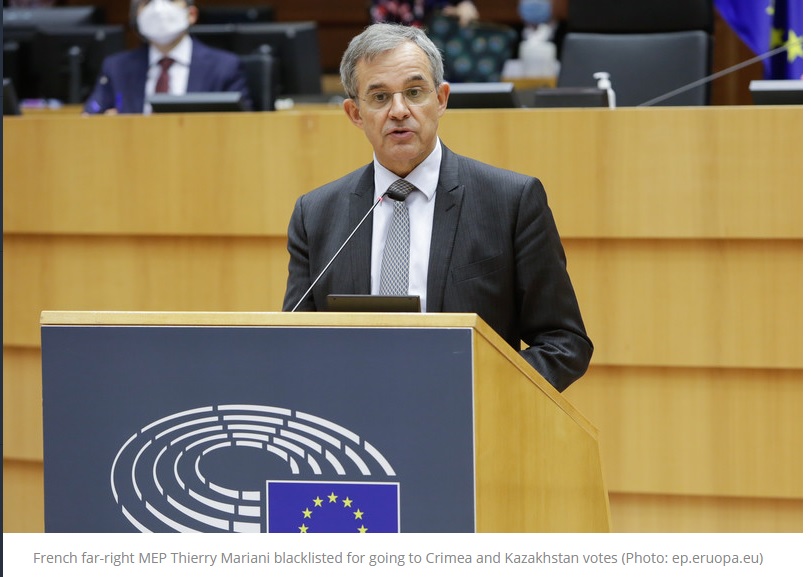By ANDREW RETTMAN EU Observer
The European Parliament (EP) has blacklisted eight MEPs and reprimanded three others for going on fake election-observation trips.
But a co-chair of the body that imposed the sanctions was said to have taken a soft approach to a member of his own political family, risking accusations of partisanship.
Five of the blacklisted MEPs were French politicians from the EP’s far-right Identity and Democracy group.
These were Virigine Joron, Hervé Juvin, Jean-Lin Lacapelle, Thierry Mariani, and Philippe Olivier.
They were sanctioned for going to observe votes in Ukraine’s Russia-occupied Crimea or in Kazakhstan.
The three other blacklisted MEPs were from the far-left Gauche unitaire européenne/Nordic Green Left (GUE/NGL) group.
They included two Irish politicians, Clare Daly and Mick Wallace, and a Spanish one, Manu Pineda, who went to observe elections in Ecuador or Venezuela.
The listing means they are barred from going on official EP election-observation missions until the end of this year.
Those who received official warnings they might soon be added to the blacklist also included two GUE/NGL members, France’s Leïla Chaibi and Spain’s Idoia Villanueva Ruiz, who went to Ecuador.
And they included a big name from the EP’s biggest group, the centre-right European People’s Party (EPP) – Fulvio Martusciello, who is a friend of former Italian leader Silvio Berlusconi and who went to Kazakhstan during recent elections there.
The 11 names were made public at last week’s meeting of an EP group which oversees genuine election-observation missions, the Democracy Support and Election Coordination Group (DEG).
They were read out by a DEG co-chair, centre-right Swedish MEP Tomas Tobé, according to several sources who listened to his briefing.
And the fake observation missions were especially “worrying”, Tobé noted, because the pandemic had prevented the EP from doing its real monitoring work.
Bogus monitoring typically involved MEPs who were invited by autocratic host-governments on all-expenses-paid junkets a few days before elections took place and who proclaimed, while brandishing their EP credentials, that the votes were free and fair, according to Stefanie Schiffer, the head of an NGO which documents the practice, the Berlin-based European Platform for Democratic Elections.
“It’s an urgent problem of high importance,” Schiffer, who took part in last week’s DEG hearing, told EUobserver.
“It also concerns national MPs from Europe and it’s being done in a systematic way on a massive scale,” she said, with some 5,000 fake observers invited to Russia’s last presidential vote, for instance.
“It’s often a gateway to corruption, via financial gifts or even games of [sexual] seduction, which later creates corrupt networks in European institutions,” Schiffer added.
“It undermines our [the EP’s] credibility and it also harms the work of other legitimate election-observation bodies, such as ODIHR,” Viola von Cramon-Taubadel, a German Green MEP, also told this website, referring to the Office for Democratic Institutions and Human Rights, a Warsaw-based European election-watchdog.
Going public
Naming and shaming those who did it was the best remedy, Schiffer and von Cramon-Taubadel added.
“They [the EP] should make the names public – to say these people are acting in contradiction to international norms,” Schiffer said.
“The naming and shaming could be done by Sassoli or by the Conference of Presidents,” von Cramon-Taubadel said, referring to EP president David Sassoli and to a club which brings together the EP’s political-group leaders and committee chairs.
But for the time being, the blacklist, which is regularly updated, is destined to remain buried in the DEG’s little-known briefings.
“It is not about naming and shaming,” Tobé and the DEG’s other co-chair, German centre-right MEP David McAllister, told EUobserver in a joint statement.
EUobserver also contacted the 11 MEPs who were either blacklisted or reprimanded last week.
“Mr Pineda is aware of the rules of the unofficial missions he has participated in, and has therefore never spoken on behalf of the EP or implied in any way that he was there with an official mandate,” Pineda’s office said.
Most of the others did not reply or declined to talk.
But the fact 10 out of the 11 names came from far-right or far-left groups in the EP posed the question if they were being targeted for political reasons, while other violators from mainstream groups got off the hook.
“The EPP has a problem and the S&D also has a problem [with fake observers],” Schiffer, the German expert, said, referring to the centre-left Socialists & Democrats group, the second largest in the EP.
For their part, Tobé and McAllister said: “Decisions on cases of individual unofficial election observation by MEPs are never taken on a partisan basis”.
They also cited chapter and verse (Annex III) of the due process that underpinned the EP blacklist.
EPP family
But for his part, Martusciello said he was treated in a rather friendly way by his fellow EPP member and DEG co-chair – McAllister.
Martusciello recently went to Kazakhstan not to observe voting, he told EUobserver, but merely in his capacity as president of the EP’s Central Asia delegation.
“I gave some speeches. That is all,” he said.
His trip and speeches did happen to coincide with Kazakhstan’s presidential elections on 10 January, however.
And the bad optics was why Tobé, the other DEG co-chair, said, last week, that Martusciello would be sent an official “warning letter”.
But, according to Martusciello, no such warning ever came.
And the only letter he received on the subject, he said, was a personal email from McAllister on 8 January, which he invited EUobserver to publish, and which appeared to endorse his trip.
“Dear Fulvio … Thank you for informing me about your planned visit to Kazakhstan,” McAllister said in the email.
“I wish you all the best and stay safe. I am looking forward to your report [on the trip],” McAllister added.
Martusciello did, in fact, get a formal warning letter, it later transpired





